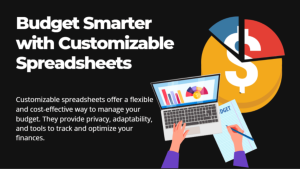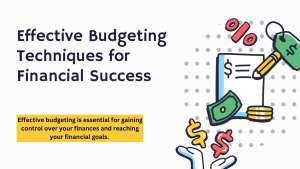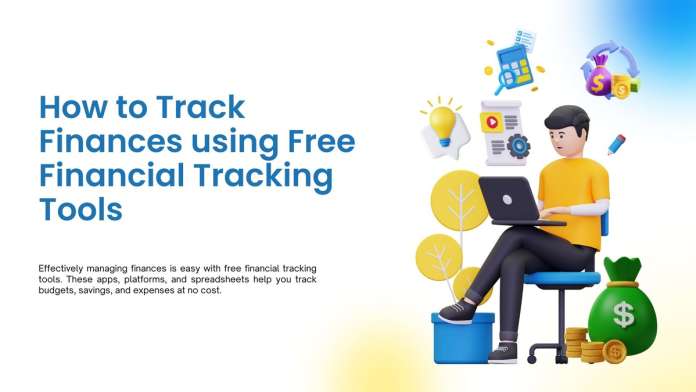Managing your finances effectively is crucial in today’s world, and the good news is, you don’t have to spend a penny to do it. Free financial tracking tools are a fantastic way to gain control over your budget, savings, and expenditures without any cost. These tools come in various forms, from apps to online platforms and even downloadable spreadsheets. Each of these options offers unique features designed to simplify the process of financial management.
Empower Your Finances with Free Financial Tracking Tools
One of the main benefits of using free financial tracking tools is accessibility. Whether you’re a student, a professional, or anyone in between, you can effortlessly harness the power of these tools on your smartphone, tablet, or computer. Many of these tools provide real-time tracking, allowing you to monitor your finances as you spend. This immediate feedback can help you make better financial decisions on the fly.
Moreover, these tools often offer insights into your spending habits, helping you identify areas where you can cut costs and save more effectively. From tracking your daily expenses to setting up monthly budgets and receiving bill reminders, these tools cover all bases to ensure you have a clear picture of your financial health.
Above all, free financial tracking tools empower you to take charge of your financial future without incurring additional expenses. As you explore budgeting apps, customizable spreadsheets, and other resources, you’ll find that starting your financial journey has never been easier or more accessible. Embrace these tools, and you’ll be well on your way to achieving your financial goals with confidence.
Budget Smarter with Customizable Spreadsheets

Customizable spreadsheets offer a flexible and cost-effective way to manage your budget. They provide privacy, adaptability, and tools to track and optimize your finances.
-
Customizable Spreadsheets for Budgeting
Taking control of your finances doesn’t have to break the bank. In fact, creating a personalized budget can be as simple as using a customizable spreadsheet. This method offers unmatched flexibility, allowing you to tailor every detail to fit your unique financial situation.
-
Flexibility and Customization
Spreadsheets are a powerful tool for those who appreciate a hands-on approach to budgeting. Programs like Microsoft Excel or Google Sheets are widely accessible and come with a range of templates to get you started. These platforms allow you to track income, expenses, savings, and even debt—all in one place. You can categorize expenses into fixed and variable, or break them down by necessity and luxury. This categorization helps you see where your money is going and identify areas where you might cut back.
-
Adaptability to Evolving Needs
A notable advantage of using spreadsheets is their ability to evolve with you. As your financial picture changes, you can add new categories, adjust your savings goals, or start tracking additional income streams. The learning curve might be slightly steeper than using apps, but the customization possibilities are virtually endless.
-
Privacy and Data Security
Moreover, spreadsheets offer complete privacy and control over your data. You’re not relying on third-party apps to handle sensitive information. You can safeguard your financial data with password protection and secure cloud storage.
-
Empowering Informed Decisions
In summary, customizable spreadsheets deliver a cost-effective and personalized way to manage your budget. By investing time into setting up a system that works for you, you empower yourself to make informed financial decisions, paving the way for a more secure financial future.
Effective Budgeting Techniques for Financial Success

Effective budgeting is essential for gaining control over your finances and reaching your financial goals. Implementing certain techniques can make a significant difference in how well you manage your money. Here are a few effective budgeting techniques you can incorporate into your routine:
- The 50/30/20 Rule: This simple yet powerful approach suggests dividing your income into three categories: 50% for needs, 30% for wants, and 20% for savings and debt repayment. By following this method, you can ensure your expenses are balanced and you are consistently saving for the future.
- Zero-Based Budgeting: With this method, every dollar of your income is assigned to a specific expense, savings, or investment. At the end of the month, your income minus expenses should equal zero. This strategy forces you to account for every dollar and can help identify spending habits that need adjustment.
- Envelope System: A more hands-on approach, the envelope system involves setting aside cash for different spending categories, each in its own envelope. When an envelope is empty, you stop spending in that category. This approach fosters discipline and prevents overspending.
- Regular Budget Reviews: Reviewing your budget regularly—whether weekly, monthly, or quarterly—helps you track your progress and make necessary adjustments. These reviews can provide insights into where you’re over or under-spending, allowing for more informed financial decisions.
By applying these techniques, you can establish a robust budgeting system tailored to your lifestyle, aiding in financial discipline and setting a strong foundation for achieving your financial goals. Embracing disciplined budgeting habits can pave the way for a more secure financial future.
Benefits of Using Free Financial Tracking Tools for Planning
![]()
In today’s digital age, managing your finances doesn’t have to come with a hefty price tag. Free financial planning tools offer a wealth of benefits that can help you take control of your budget without spending a dime.
-
Accessible Financial Planning
One of the primary advantages is accessibility. Free tools are often available as apps or web platforms, making them easy to use from anywhere, whether you’re at home or on the go. They offer features like expense tracking, budgeting templates, and financial goal setting, all designed to give you a clearer picture of your financial health.
-
Simplified Financial Management
These tools also simplify financial management by automating tasks that would otherwise take up a lot of time. For instance, they can categorize expenses, generate reports, and send reminders for bill payments. By doing so, they reduce the likelihood of human error and ensure that you have an accurate understanding of where your money is going.
-
Real-Time Connectivity
Additionally, many free tools offer connectivity with your bank accounts, allowing real-time updates and insights. This can help you make informed decisions quickly, such as identifying unnecessary expenses you can cut back on to save more.
-
Building Better Financial Habits
Moreover, using free financial tools can help build better financial habits. By regularly engaging with your finances, you’re more likely to stay on top of your budget, recognize patterns in your spending, and make proactive adjustments.
-
Achieving Financial Goals
Incorporating these free resources into your financial planning can lead to smarter spending, increased savings, and overall peace of mind as you work towards your financial goals—all without breaking the bank.
Conclusion: Starting Your Financial Journey with Confidence
Embarking on a financial journey can seem daunting, but with the right tools and strategies, you can navigate it with confidence. Free financial tracking tools offer a fantastic starting point, providing the resources necessary to take control of your financial well-being without burdening your budget.
By utilizing these free solutions, you’ve already taken the first step toward smart financial planning. Whether it’s a budgeting app that syncs your accounts or a customizable spreadsheet that lets you track every penny, these tools make managing money more accessible. They not only help you understand where your money is going but also enable you to make informed decisions about saving and spending.
Implementing effective budgeting techniques, like the 50/30/20 rule, helps organize your finances, ensuring that your needs, wants, and savings are proportionately balanced. Such techniques, supported by the right tools, highlight spending patterns, identify potential savings, and clarify financial goals. This clarity fosters confidence, empowering you to take proactive steps toward building a secure financial future.
The benefits of using free financial tools extend beyond immediate budget management. They foster long-term financial literacy and discipline, paving the way for larger financial goals like buying a home or preparing for retirement. As you start this journey using these resources, you’re not just tracking expenditures—you’re building a roadmap for financial success.
Embark on your financial journey today with these free tools, and move forward with the assurance that you are equipped to make informed and impactful financial decisions.
Read More: Top 10 Popular SaaS Marketing Blogs in 2024

